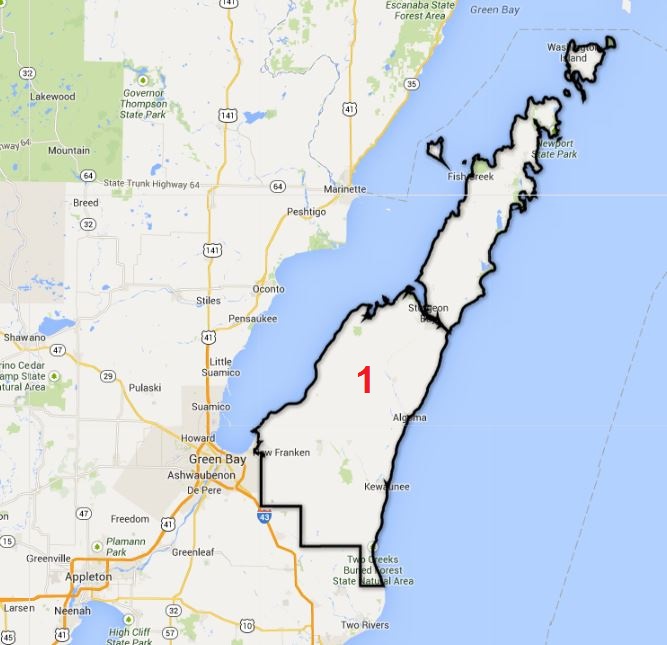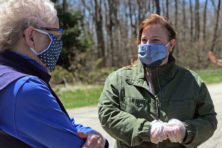Kitchens Touts Steady Leadership, Jensen Vows to Stir the Pot
- Share
- Tweet
- Pin
- Share

The two candidates for Wisconsin’s 1st Assembly District give voters a choice as to who will represent them in Madison.
Incumbent Joel Kitchens (R-Sturgeon Bay) is leaning on his experience as he seeks a fourth term, pointing to his work on water-quality, environmental and education issues. Egg Harbor restaurateur Kim Delorit Jensen proudly wears the badge of a “pot stirrer” who vows to challenge the status quo if voters choose her Nov. 3.
“I’m going to bring a working-class voice,” said Jensen, who took over her first Door County restaurant 20 years ago and has since added three more.
Joel Kitchens (Incumbent)

Republican, first elected 2014
Age: 62
Website: joelkitchens.com
Education: Doctor of veterinary medicine, Ohio State University; bachelor of science in dairy science, Ohio State University
Background: Founder, Door County Veterinary Associates; president, Sturgeon Bay Board of Education for 13 years, member for 15 years; member, Sturgeon Bay Moravian Church; youth baseball and softball coach; member, Wisconsin Veterinary Medical Association; member, Northeast Wisconsin Veterinary Medical Association
Kim Delorit Jensen

Democrat
Age: 51
Website: kimjensenforassembly.com
Education: Attended University of Utah, multiple continuing-education courses
Background: Born and raised in Green Bay; bought Village Cafe in Egg Harbor in 2000; now owns five restaurants as part of Mojo Enterprises (Mojo Rosa’s, Villaggio’s, Pink Bakery, Village Cafe, Bangkok); member, Destination Door County Executive Committee; member, Egg Harbor Business Association Board of Directors
COVID-19
Jensen said her frustration over the legislature’s inaction during the COVID-19 crisis spurred her to get on the ballot. When the legislature overturned Gov. Evers’ Safer at Home order in May, she said they should have had a replacement plan.
“How hard would it be to have a damn plan?” she asked. “Even if it’s just, ‘Wear your masks, and we’re going to enforce it.’ As a business owner, it would have been nice to have some guidance and stop pitting us against each other.”
Kitchens blamed Evers for being unwilling to work with the legislature, but he said that overall, there isn’t much more the legislature could have done. He said his office helped hundreds of constituents get unemployment benefits when the state’s Department of Workforce Development failed to keep up with claims. (Evers fired department head Caleb Frostman last week.)
“You never want to say this is the best we could have done, but a lot of it is handled by departments,” Kitchens said. “We can’t stop the virus. Individual actions have a greater impact than the government can.”
Environmental Issues, Farming
Though Jensen has repeatedly questioned Kitchens for not doing enough to address the water-quality problems that have plagued Kewaunee County, Kitchens considers his efforts on water-quality and environmental issues to be the work he’s most proud of. He points to his effort to restore funding to the Knowles-Nelson Stewardship Fund and his work to bring farmers and conservation groups together to come up with solutions to manure management.
“It’s not possible to solve the water problem without the farmers’ buy-in,” he said. “We created a nutrient-exchange program with conservation and farm groups. Bringing those sides together is one of the things I’m most proud of.”
Kitchens also noted his work pushing the DNR to write new rules for manure management and pushing for a study on phosphorus and suspended solids entering area tributaries.
Jensen said the state should do more to level the playing field between small and large farms to limit the growth of CAFOs, suggesting a cow tax after a certain number of animals, instituting incentives for people to buy small farms and increasing funding for water-quality monitoring at the Department of Natural Resources.
Kitchens said there’s a fundamental misunderstanding of what’s happening in agriculture in Wisconsin.
“I don’t know what policies we’ve implemented that favor large farms,” he said. “Going back to small farms, that’s never going to happen, and it’s not because they’re put out of business by large farms. It’s happening because you can’t find kids who want to work 80 hours a week, because there aren’t many people who want to live that life anymore.”
Broadband Access
The candidates also differ on their approach to expanding broadband access. Kitchens said he supports more grants for broadband expansion.
“In rural areas, there are simply not enough subscribers for the free market to work without help from the government,” he said. “The pandemic has shown just how important broadband is in so many ways.”
Jensen agreed, but she suggested that the state approach broadband as a utility.
“Broadband touches almost every other issue we talk about, from attracting residents to education, to telehealth and housing,” Jensen said. “It’s not a luxury anymore. It’s a necessity. We need to talk to Wisconsin Public Service and WE Energies about running fiber optics to every home in the state.”
Legalizing Marijuana
Kitchens said he isn’t comfortable legalizing recreational marijuna and prefers to see how it plays out in other states. Jensen wholeheartedly supports legalization, both to reduce enforcement expenses and to create a revenue source for the state.
Raising the Minimum Wage
Jensen is a proponent of raising the minimum wage to $15 an hour.
“We have to pay people so they can live, stay here and put down roots in our community,” Jensen said.
Kitchens said raising the minimum wage in Wisconsin would have little effect and could lead to job losses.
“Because we have such a strong economy in Wisconsin, the minimum wage has been really irrelevant,” Kitchens said. “I don’t know of a minimum-wage job in Wisconsin. I certainly want working people to make a living wage, but I would do it through an earned income tax credit, where if you make less than $15, you get a tax credit for the difference.”
Drawing District Maps
Kitchens signed on to legislation to change the redistricting process in Wisconsin, but he said he does not believe it’s much of a factor in Wisconsin elections.
“I do think the current system erodes voters’ trust in the system,” he said. Jensen expressed support for redistricting reform as well.
Assembly District 1

Wisconsin’s 1st Assembly District includes all of Door and Kewaunee counties, plus portions of Brown and Manitowoc counties. Each Wisconsin Assembly district represents an average of 57,444 residents. State Assembly representatives earn a salary of $52,999, plus per diem for time spent in Madison.
In 2018, incumbent Joel Kitchens defeated Roberta Thielen by receiving 68.4 percent of the vote: 20,651 to 9,519. In 2016, Kitchens garnered 60.1 percent of the vote, and during his first election in 2014, Kitchens received 56.7 percent of the vote.


